
Taking it as it comes - Mitch Langerak Interview Part II
_klein.jpg) Yesterday we left you with the first part of our Mitch Langerak interview. In our second and final part Mitch Langerak talks about the A-League and guides us through his career which has taken the 22 year old - and recent winner of the PFA Harry Kewell Medal winner for best young player - from Bundaberg in Queensland / Australia to Canberra and Melbourne and finally to beautiful Dortmund, he tells us about his favourite goalkeeper and why he will not just copy him. But first of all he is looking for a cricket team in Dortmund.
Yesterday we left you with the first part of our Mitch Langerak interview. In our second and final part Mitch Langerak talks about the A-League and guides us through his career which has taken the 22 year old - and recent winner of the PFA Harry Kewell Medal winner for best young player - from Bundaberg in Queensland / Australia to Canberra and Melbourne and finally to beautiful Dortmund, he tells us about his favourite goalkeeper and why he will not just copy him. But first of all he is looking for a cricket team in Dortmund.
sg.com: What about the role of Cricket in Australia?
Mitch: Everyone plays cricket. Cricket goes for the summer and rugby and soccer go for the winter, so you have six months soccer, the next six months cricket.
sg.com: But you follow cricket, too?
Mitch: Yeah, definitely.
sg.com: But you don’t have a cricket team in Germany right now?
Mitch: There are cricket teams in Germany?
Sg.com: They do have a cricket team in Germany like Hamburger SV playing in the Bundesliga.
Mitch: Yeah? Does Borussia Dortmund have a cricket team? No? Maybe this has to change (laughs). I’ll play with them during the summer break
sg.com: You signed to Borussia and we didn’t know anything about you. Maybe you can give us some information about your history. You were born up in Queensland, right?
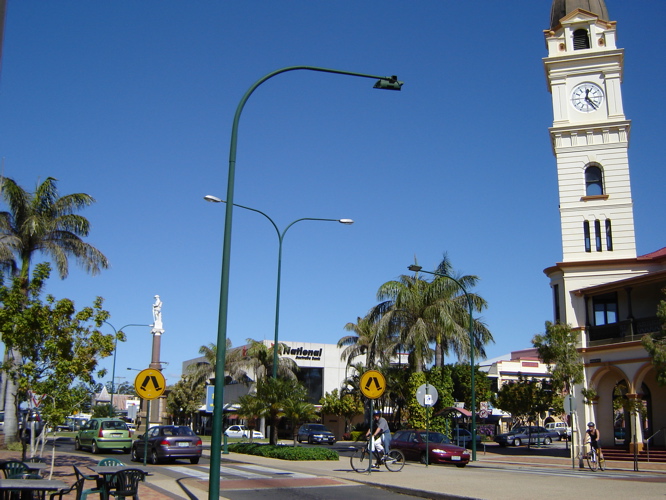 Mitch: Queensland is different to Melbourne. Queensland is very laid back. I lived there til I was 16, 17. Then, I was signed by Melbourne Victory, so I moved to Melbourne, we had a little success and won the league a couple of times. We did really well. It was a fantastic time there.
Mitch: Queensland is different to Melbourne. Queensland is very laid back. I lived there til I was 16, 17. Then, I was signed by Melbourne Victory, so I moved to Melbourne, we had a little success and won the league a couple of times. We did really well. It was a fantastic time there.
sg.com: It must have been a pretty big step for you to move from Queensland to a city like Melbourne?
Mitch: Yeah, Melbourne is a massive city but it is a good city. After having lived there for four months I bumped into people I’d know and it becomes your new home. I grew up in small town, a coastal town and a beach. I did a lot of surfing, it was really relaxed. To be fair, there are a lot of other sports there as well. So football isn’t as big up there. But I had a few good mates and we would play football all the time. I then moved from Bundaberg to the AIS.
sg.com: The AIS?
Mitch: The AIS is the Australian Institute of Sports. There are a lot of different sports you have there. The Australian Football team, the Australian Swimming team and it is in some way similar to a college but just only with sports. You don’t have school over there, you’re about 16, 17, 18 and you focus on athletics or the Olympics or something like that. And obviously, the professional football clubs come to the IAS and ask “What defenders have you got?” and the players get picked up from there. I was there for a year. The institute is located in Canberra and pretty much the whole Australian junior team got signed to different A-League clubs
sg.com: You then got signed by Melbourne Victory ...
Mitch: Yes, from the AIS. From there on, I was on loan for four months to another Melbourne side, I played regularly there – that was a Divsion team – but I was with Victory at the same time. So I was still with Victory but on the weekend I played with the other team.
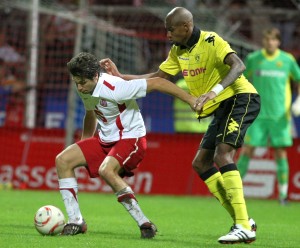 sg.com: But you trained with Melbourne Victory the whole time?
sg.com: But you trained with Melbourne Victory the whole time?
Mitch: I was on loan but at the same time with Victory. Yeah, it’s just the same thing. Train, train, train and on Saturday, I would go to the other team and just play for them. For these three or four months, I played around 16 games and I was able to play regularly. It was good for my development. Then I got back to Melbourne and competed with New Zealand national keeper Glenn Moss. At first he was in goal and then I got between the posts. This is how football goes. One keeper is in goal, the other is on the bench.
sg.com: When you signed to Dortmund, did you speak to Michael Theoklitos, who went to Norwich into England’s First Division and now is back in Australia after only playing a handful of games.
Mitch: I spoke to him. He trusted me and said “Mitch, without a doubt, you have to go. There is no question about it” Even though he is back in the A-League now but we still kept in contact the whole time and he supplied me with a lot of information on Europe. Also Kevin Muscat, who was my captain at Victory, had a good career in England, so I spoke to him as well.
sg.com: Where do you see yourself in the future? Will you be back in Australia after your contract runs out in Dortmund?
Mitch: No, I don’t think so. I think it’s hard to say in football because you don’t know what the future has in store for you. You can’t say in January 2012 I want to have played so many games or something like that. A lot of things can happen, you just got to take it as it comes. But I think you are never happy until you are number one, I guess.
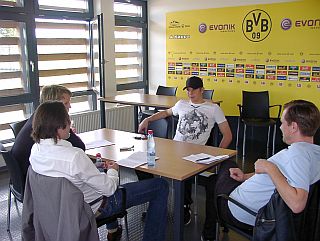 sg.com: Have you been in touch with Holger Osieck, the new Socceroos manager, yet?
sg.com: Have you been in touch with Holger Osieck, the new Socceroos manager, yet?
Mitch: No, I have spoken to the Australian national team goal keeper coach. He lives in Melbourne as well. He told me he would be coming over to see a few teams with Australians play. They keep an eye on the players based in Europe. The thing about that is that most of the national team is playing in Europe, in Holland and England and Germany especially. It is important for the coaches to keep an eye on those players. It would not be a good idea to travel back to Australia for every match, so the trainers try to organize matches in Europe, for example against Switzerland or Poland, so that the traveling does not take so much time.
sg.com: You were not called up for the team so far?
Mitch: I was on standby just in case that one of the other goalkeepers gets injured. I don’t really expect to be called up anytime soon. Australia has pretty good goalkeepers so there is a tough competition.
Sg.com: But Schwarzer is getting older. He is not gonna be in goal for ages to come.
Mitch: Maybe they start looking but it is the furthest thing from my mind right now. My whole focus is on being here and working here.
Sg.com: Football in Australia. Something we Europeans don't know much about. The A-League is a fairly new league. Has there been pro-football in Australia before the A-League?
Mitch: In Australia they had a national competition. It ran from the 70s to 2004. It never had the same standing as the Bundesliga of course. They stopped that league and started a new one. So most of the clubs at the moment are only five years old. There are eleven teams, one in each city. Melbourne now has two teams. Victory and the Hearts. The league is doing well. The top teams go through to the Asian Champions League and that of course is good competition as well. A lot of young players play there but also a lot of Australian national team players who have been in Europe for ten years and want to come back to Australia, whereas before the football there just wasn’t good enough for them
Sg.com: Are those teams all based down on the Coast Line?
Mitch: (with his hands draws a map of Australia in the air) Well, most of the teams are on the bottom right corner here (points finger) but there is one team over in Perth, one in Adelaide at the bottom and also we’ve got one team from Wellington in New Zealand. I think the trip from Wellington to Perth is the longest in league football worldwide. It is eight hours on a plane, you go overseas. It is a long trip.
Sg.com: Do they have away fans?
Mitch: Yes they do. Of course, it is not as big as in Dortmund but you do get a few hardcore fans with every team
Sg.com: How does the league system work? Is it a franchise system like in America?
Mitch: It is a franchise system, yeah.
_klein.jpg) Sg.com: And you also have a salary cap in Australia – just like in Amercia. Could you tell us a little more about how this works?
Sg.com: And you also have a salary cap in Australia – just like in Amercia. Could you tell us a little more about how this works?
Mitch: That is another thing that makes the league very healthy. The whole team is under a salary cap of 2.35 Million Australian Dollar, with the exception of one player. So each team can have one marquee player and he can get paid more money. So technically you could buy a Ronaldo (laughs) … but only one. The rest of the squad must be under the Salary Cap. It is a little bit unusual but I think it is good for the long term development.
Sg.com: Have there been stars coming over from Europa as marquee players?
Mitch: For instance Dwight Yorke came over, he was one of the marquee players, we had Juninho Paulista and currently we have Robbie Fowler. So there are a few players who come to Australia. Obviously they come for the Australian lifestyle as well because it is different
Sg.com: How did the Salary Cap affect your transfer to Borussia. We read that it was tough for Victory to sign an equally good keeper for the money you were on.
Mitch: That's right. I was in Melbourne for three years, so it made it a bit hard for them but that is not really my problem (laughs)
Sg.com: Of course, but it did make your move to Dortmund a bit harder. At first Victory rejected the offers of Borussia Dortmund. There were rumors you were signing with Borussia but until the transfer finally came through it took some three weeks
Mitch: That’s right. It took some time. And it was hard for me as well. At first the club said “No, no, no” but I wanted to come obviously. It was a fantastic time in Melbourne but I wanted to come and I am glad it all worked out in the end and I got here
Sg.com: Borussia paid a transfer fee for you and it might as well be the biggest one they ever paid for a second keeper. Does this put any pressure on you?
Mitch: You can’t look into it too much. I try to give the best I can, I train and try to get better every day and I can’t let this pressure me. In the long term it will pay off for Borussia. I hope I will stay here for a long time to come.
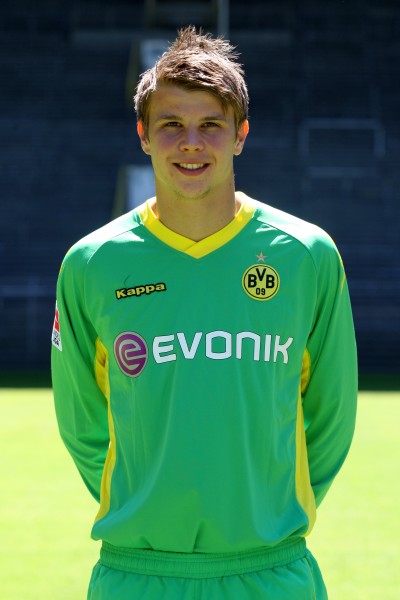 Sg.com: The club was willing to pay for you, even though you were unlikely to start, the club must have a strong believe in your abilities.
Sg.com: The club was willing to pay for you, even though you were unlikely to start, the club must have a strong believe in your abilities.
Mitch: I hope so. Since I have been here I felt trust from all of the players and coaches and that is a good thing to have. The encouragement and the believe the coaches have for and in every single player of the squad, it gives you confidence. But of course, football is about what you do on the pitch
Sg.com: Are there any role-models for you?
Mitch: I wouldn’t say role-models but I pick stuff from every goal keeper I watch. When I sit on the bench and watch Roman and see what he does and I watch all the other goal keepers and try to pick the best things from them.
Sg.com: So there is not a player you watch more closely?
Mitch: Well my favorite keeper is Iker Cassilas but I wouldn’t try and model myself after him, of course he´s got a great women at his side, but other than that I try and pick things from every goalkeeper´s game and use it to get a bit better.
Sg.com: How would you describe your style of goal keeping?
Mitch: Oh, that is a tough one. How would I describe my style of goal keeping? I try to communicate as much as I can with my players but no, I can’t really explain my style of goal keeping.
Sg.com: Is there anything you learned from Roman?
Mitch: He is really calm and relaxed, he is confident. When a shot comes in he is prepared for that. Like in the Lautern game. He keeps up his concentration, even if we are 4-0 up and he gets a shot on the goal he is fully there with his mind.
Sg.com: Where will Borussia finish?
Mitch: Well, hopefully we finish first. No! (laughs) We don’t have any expectations. We take it from game to game and try to keep the run up as long as we can and see where we end up.
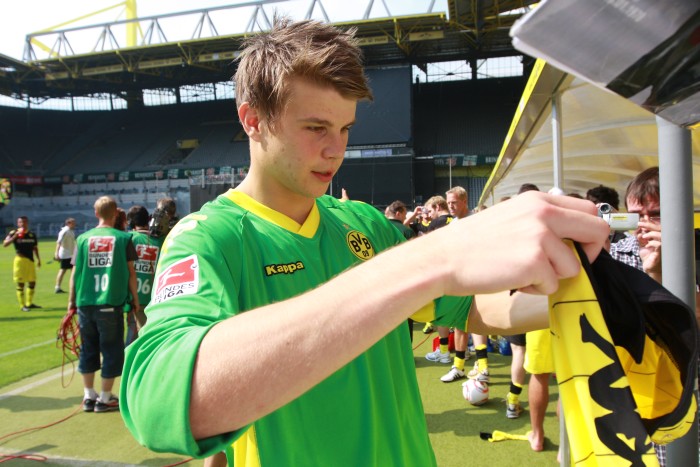 Sg.com: Is there any place in Europe you want to travel to during the Europa League campaign?
Sg.com: Is there any place in Europe you want to travel to during the Europa League campaign?
Mitch: I was pretty happy we were drawn against Paris, because Paris is one of the cities I wanted to see for a long time. It is different from Baku, if you know what I mean.
Sg.com: Mitch, thank you for your time
Mitch: No problem, thank you very much.
steph, vanni, web, peter 14.10.2010
Weitere Artikel




